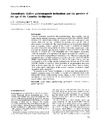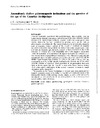Identificador persistente para citar o vincular este elemento:
https://accedacris.ulpgc.es/jspui/handle/10553/46284
| Título: | Anomalously shallow palaeomagnetic inclinations and the question of the age of the Canarian Archipelago | Autores/as: | Carracedo, J. C. Soler, V. |
Clasificación UNESCO: | 250621 Vulcanología | Palabras clave: | Lanzarote (Canary Islands) Geochronology Geomagnetic excursions Palaeomagnetism |
Fecha de publicación: | 1995 | Editor/a: | 0956-540X | Publicación seriada: | Geophysical Journal International | Resumen: | Extensive geological, geophysical and geochronological data available from the Canary Islands establish conclusively that formation of the oldest subaerial volcanic structure of the islands began during the Miocene. A mid‐Cretaceous age for these volcanic formations has been postulated in previous works on the basis of palaeomagnetic determinations. The results obtained in the present palaeomagnetic study of Lanzarote include analysis of the record of variations of magnetic inclination in boreholes that penetrate the whole of the oldest volcanic series. They show that the excessive age previously assigned to these formations is due to the utilization of volcanic units with abnormally low (<15°) magnetic inclinations (LGIs). In Lanzarote, lavas exhibiting LGIs appear interbedded in a volcanic series that, overall, shows a typical Miocene inclination (∼45°). The units stratigraphically beneath and above the LGI horizons give, in fact, directions consistent with the Middle‐Upper Miocene field direction (D= 359°, I= 45°, with k= 29, a95= 6.7° and a palaeopole of 87°N, 178°E), thereby confirming the Miocene age of the oldest subaerial volcanics of Lanzarote. Short excursions of the geomagnetic field seem likely to be the explanation for these LGIs, since other factors such as tectonic tilting, post‐eruptive modification of the primary remanence or errors in sample orientation can be disregarded. The detection in the Canary Archipelago of volcanic units with abnormally low magnetic inclinations seems to be related to the relatively continuous record of the geomagnetic field in rapidly growing volcanic edifices, as seems to be indicated by the presence of a few (usually one or two) short polarity events in volcanic suites of several hundred metres thickness. | URI: | https://accedacris.ulpgc.es/handle/10553/46284 | ISSN: | 0956-540X | DOI: | 10.1111/j.1365-246X.1995.tb07003.x | Fuente: | Geophysical Journal International [ISSN 0956-540X], v. 122 (2), p. 393-406 |
| Colección: | Artículos |
Citas SCOPUSTM
22
actualizado el 08-jun-2025
Citas de WEB OF SCIENCETM
Citations
20
actualizado el 22-feb-2026
Visitas
125
actualizado el 16-mar-2024
Descargas
180
actualizado el 16-mar-2024
Google ScholarTM
Verifica
Altmetric
Comparte
Exporta metadatos
Los elementos en ULPGC accedaCRIS están protegidos por derechos de autor con todos los derechos reservados, a menos que se indique lo contrario.

